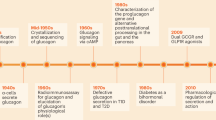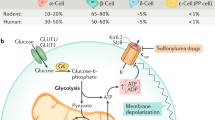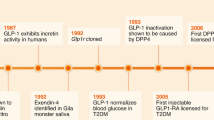Abstract
GLUCAGON is as essential as insulin in some species for the maintenance of blood glucose, although the factors influencing its release are less well understood. It has been thought, for example, that a low level of blood glucose might serve as a primary stimulus to secretion1–3, but the effects obtained with low glucose concentrations have been small, and may not have great physiological significance. High levels of amino-acids may also promote the secretion of glucagon3–5, but again the regulatory importance of the eifect is questionable. We here report a very marked inhibition of glucagon release by fatty acids and ketone bodies in vitro. It seems quite likely that the α cells of islets are more sensitive to variations in the levels of circulating fatty acids than to other metabolites.
This is a preview of subscription content, access via your institution
Access options
Subscribe to this journal
Receive 51 print issues and online access
$199.00 per year
only $3.90 per issue
Buy this article
- Purchase on Springer Link
- Instant access to full article PDF
Prices may be subject to local taxes which are calculated during checkout
Similar content being viewed by others
References
Vance, J. E., Buchanan, K. D., Challoner, D. R., and Williams, R. H., Diabetes, 17, 187 (1968).
Unger, R. H., and Eisentraut, A. M., Hormones in Blood, 1 (edit. by Gray, C. H., and Bacharach, A. L.), 113 (Academic Press, London, 1967).
Ohneda, A., Aguilar-Parada, E., Eisentraut, A. M., and Unger, R. H., Diabetes, 18, 1 (1969).
Unger, R. H., and Eisentraut, A. M., Hormones in Blood (edit. by Gray, C. H., and Bacharach, A. L.), 1, 117 (Academic Press, London, 1967).
Unger, R. H., and Eisentraut, A. M., The Structure and Metabolism of the Pancreatic Islets, 2 (in the press).
Howell, S. L., and Taylor, K. W., Biochim. Biophys. Acta, 130, 519 (1966).
Hellerstrom, C., Hellman, B., Petersson, B., and Alm, G., The Structure and Metabolism of the Pancreatic Islets (edit. by Brolin, S. E., Hellman, B., and Knutson, H.), 117 (Pergamon, London, 1964).
Garland, P. B., Newsholme, E. A., and Randle, P. J., Biochem. J., 93, 665 (1964).
Taylor, K. W., Howell, S. L., Montague, W., and Edwards, J. C., Clin. Chim. Acta, 22, 71 (1968).
Greenwood, F. C., Hunter, W. M., and Glover, J. S., Biochem. J., 89, 114 (1963).
Assan, R., Rosselin, G., Drouet, J., Dolais, J., and Tchobroutsky, G., Lancet, ii, 590 (1965).
Seyffert, W. A., and Madison, L. L., Diabetes, 16, 765 (1967).
Montague, W., and Taylor, K. W., Nature, 217, 853 (1968).
Steinberg, D. M., Shafrir, E., and Vaughan, M., Clin. Res., 7, 250 (1959).
Author information
Authors and Affiliations
Rights and permissions
About this article
Cite this article
EDWARDS, J., HOWELL, S. & TAYLOR, K. Fatty Acids as Regulators of Glucagon Secretion. Nature 224, 808–809 (1969). https://doi.org/10.1038/224808a0
Received:
Revised:
Issue Date:
DOI: https://doi.org/10.1038/224808a0
This article is cited by
-
Interrelationships of liver and brain with special reference to reye syndrome
Journal of Inherited Metabolic Disease (1991)
-
Effect of oleic acid on arginine-induced glucagon secretion by the isolated perfused rat pancreas
Acta Diabetologica Latina (1979)
Comments
By submitting a comment you agree to abide by our Terms and Community Guidelines. If you find something abusive or that does not comply with our terms or guidelines please flag it as inappropriate.



